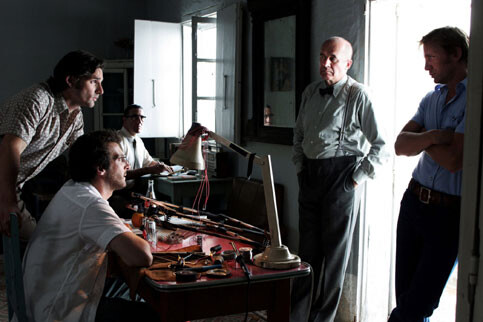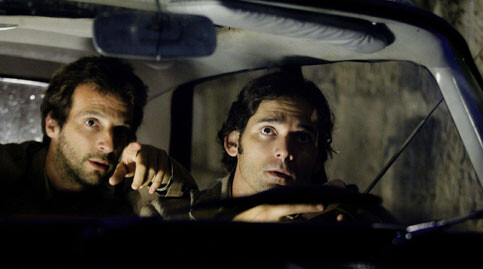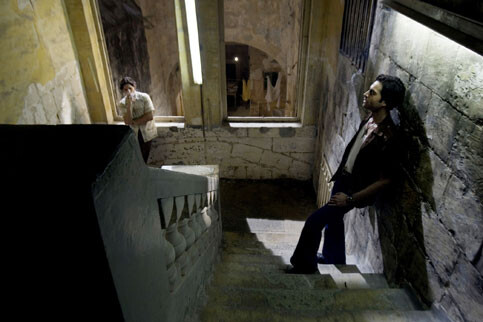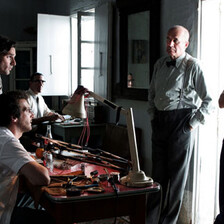The Electronic Intifada 14 January 2006

The Mossad team assembled to take out revenge for the 1972 Munich Olympics killings (Universal)
“What’s going on in that head and that mind?” an American news commentator asks during a montage of media reports on the kidnapping of eleven Israeli athletes by the Palestinian Black September group. The astonished newsman is questioning the Palestinian hostage takers who end up murdering their eleven captors during Germany’s botched rescue attempt. But Munich’s director Steven Spielberg, for now, is more interested in what’s going on in the mind of the Israeli agent in charge of the state’s response to the Munich killings.
However, whether we really get into the minds of the unlikely group of Israeli Mossad agents who are assembled by Israeli Prime Minister Golda Meir to avenge the killings is debatable. It is mostly Spielberg’s moral dilemmas that we access, but not all the questions necessary to resolving his moral dilemma are posed.
Lead by the young father-to-be Avner (played by Eric Bana), the group is furnished with unlimited cash and a list of names of Palestinians to kill, but not much else. The film audience doesn’t get much more information on the characters than the Mossad agents give each other when they are carrying out their mission, making it difficult to particularly care what happens to the men in Avner’s team - even as they are hunted and killed themselves. Nevertheless, the film succeeds even though it is difficult for anyone to be fully empathetic with the blank Mossad agents that are the story’s focus.
The audience doesn’t need the rhetorical devices delivered through the Mossad agents’ dialogue to come to doubt the righteousness of the mission. Spielberg sets the audience up to want vengeance for the bloody Munich killings by depicting the panicked Palestinian gunmen emptying rounds of machine-gun fire into the defenseless athletes as they sit tied up in helicopters on the airport tarmac. But soon it is the “good guys” that are committing the same violence, without any confirmation that the men they are killing had a hand in Munich, as well as killing people whose names aren’t even on the list.
Some of the agents come to question themselves - bombmaker Robert declares that “we’re losing it [our Jewish righteousness]; I’m losing my soul” as the group goes over a laundry list of violence that has spun off from their own mission of retribution. And at one point Avner asks the Mossad big-wig Ephraim who acts as the interlocutor between Avner and Meir, “Why can’t we just arrest them like we did Eichmann?”

Mossad bombmaker Robert (Mathieu Kassovitz) and team leader Avner (Eric Bana) (Image: Universal)
As Salon.com’s Michelle Goldman has pointed out, that the Mossad agents even come into such doubt in the film is extremely flattering towards Israel. It is debatable that anyone who would be employed by the organization would be so troubled by flaunting the rule of law when that seems to be what Mossad does best. The effect is that it is Spielberg, rather than the characters, asking these questions. But the film is a morality play, not a documentary, and as such Spielberg is entitled to push reality.
“All this blood, all of it comes back to us,” says Robert, the first to bail from the mission. And the most seasoned agent among them soberly states, “Each time we kill we create six more,” noting that the new leaders replacing the assassinated Black September leadership are that more extreme - and for some of them, “Black September is not violent enough.”
And though the philosophical questions sometimes feel forced when posed through dialogue, the message that there is no personal security in a world of lawlessness is vividly portrayed by Avner’s eventual breakdown. In one particularly effective scene, Avner suffers a state of paranoia and dismantles his phone and tears up his mattress, suspecting that his bedroom has been booby-trapped in the manner that they have so cunningly killed their targets. Not even the best Mossad agent, the film teaches us, will be immune from fear and insecurity. Avner ends up retreating to his closet, echoing a story told earlier in the film of an agent who became overcome by paranoia and ended up sleeping every night in a closet.

Hunted PLO member Ali (Omar Metwally) explains what dispossession means to Avner (Eric Bana) (Image: Universal)
Once reunited with his young family that he has transplanted from their native Israel to Brooklyn, Avner’s nationalist feelings recede as he is overcome with the desire to protect his family from harm - including from the Israeli government, which unceremoniously dismisses him from his duties with a handshake after nine of the eleven names on the list are killed.
In the film’s powerful conclusion, Avner meets Ephraim in Brooklyn. Avner fruitlessly asks for evidence that the men he killed were involved in planning Munich, bringing to full circle the theme of accountability set up earlier in the film by a Mossad accountant repetitively asking Avner to save his receipts. Avner offers an olive branch, saying it’s written in some old books that one should invite a stranger into his house to break bread with his family. Ephraim does not accept the invitation, and the scene poignantly illustrates Avner’s - or, rather, Spielberg’s - disillusionment with the State of Israel, which consistently violates the law as well as Jewish values while waging the conflict it has only aggressively perpetuated.
Spielberg isn’t necessarily concerned about the Palestinians (however, he doesn’t discount their nationalist motivations, and one of the Palestinian targets articulately explains to Avner, “We want to be [a nation]. Home is everything”). What drives the film is Spielberg’s own crisis of faith in a nation which carries an entire religion’s symbol on its flag while it routinely carries out its extra-judicial “targeted killings” with deadly consequences for innocents caught in less-than-precision operations. In the film, a honeymooning Israeli couple are seriously injured in a Mossad hotel bombing, while in reality, 14 bystanders - including nine children - were killed in the 2002 assassination of Hamas leader Sheikh Salah Shehadeh in Gaza City.
However, if one’s conscience is to be truly clear, it is the actions of Avner’s parents’ generation which need to be acknowledged and reconciled. After his mission, Avner asks his mother, who lost many family members during the Holocaust, if she wants to know what he did on his mission and she declines. “Whatever it took, whatever it takes, we have a place on earth at last,” she tells him. But whether a people — citizens of Israel like Avner or supporters of the state like Spielberg — can feel morally whole with such fresh wounds is the question that truly needs to be dealt with.
Related links
Currently based in Ramallah, Maureen Clare Murphy is Arts, Music and Culture Editor for The Electronic Intifada




